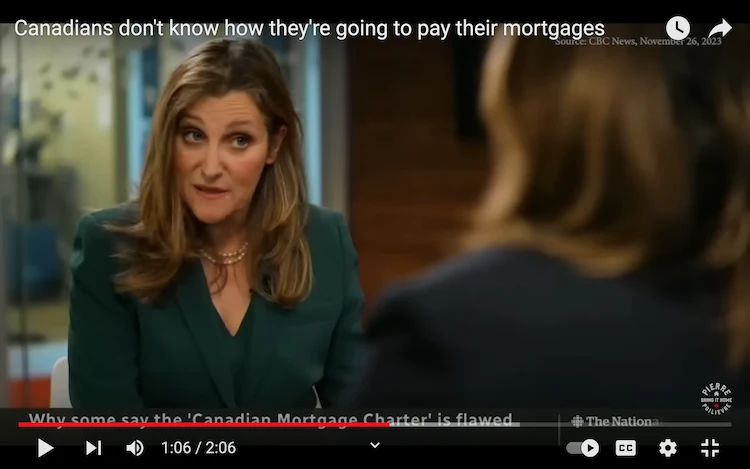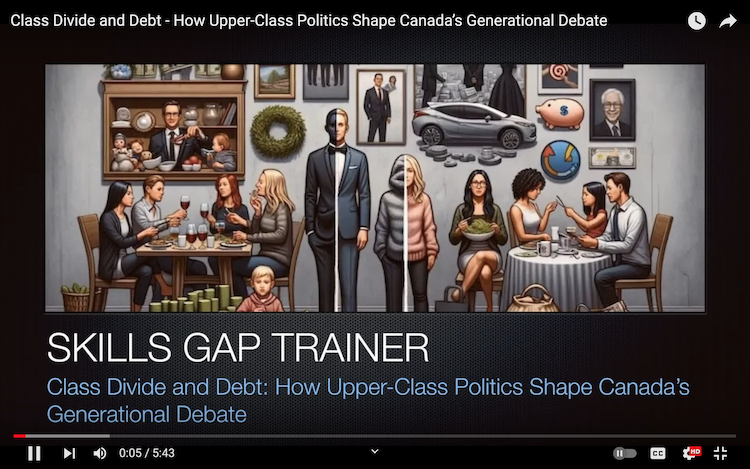Video: Canadians don’t know how they’re going to pay their mortgages
Link: https://youtu.be/MwzyTzschrk?si=OlQbWcPWClazA5v0
Video Title: Class Divide and Debt – How Upper-Class Politics Shape Canada’s Generational Debate
Link: https://youtu.be/I_KxCeTxpxY?si=6FUYpV04E65TTwc2
@skillsgaptrainer “Recent political trends reveal a fascinating divergence in how Liberals and Conservatives cater to varying economic interests and generations. Liberal policies often find resonance with demographics less reliant on active economic participation. This includes retirees, middle-upper class, and upper-class individuals who are in stable financial situations, often owning their homes outright and possessing higher incomes. Such groups might prioritize issues like social welfare, environmental sustainability, and wealth redistribution, typical of liberal ideologies.
However, a critical aspect to consider here is the economic impact of wealth redistribution policies via the enlargement of the national debt instead of through taxation. The implementation of “national debt caused inflation and interest rate rises”, such policies often involves significant government spending, which can lead to increased national debt and increased monthly payments. In Canada, like in many other countries, debt is managed through borrowing, primarily from banks.
The Liberal Party national debt creation process results in the substantial rise of interest fees, and ongoing and rising costs, possibly a few hundred billion every few years that are then owed by the people of Canada to banks, in an ongoing manner, burdening the national economy with high interest rates, and therefore enormous living costs. The result is that the wealth redistribution that was advertised by the Liberal Party as being for the people, transfer the people’s wealth to the banking sector. If the Liberal Party wishes to do wealth redistribution, it should do so from taxation not from national debt system, so that the “value” or “wealth” is transferred to the people and not to the banks.
Critics argue that this “national debt based approach to wealth redistribution”, rather than through taxation, is not a sustainable economic solution, and could lead to a cycle of perpetual debt. They suggest that it might result in the allocation of a considerable portion of the country’s resources to servicing debt, rather than directly funding government services or creating the vital clean energy and small modular reactors of the future. This scenario raises concerns about the long-term economic health of the nation and the effectiveness of national debt based re-distributive policies.
In summary, while Liberal policies might appeal to certain demographics with their focus on redistribution and social welfare, there’s an ongoing debate about the fiscal sustainability of these approaches, especially considering the implications for national debt, economic stability, industrial progress, job market development, business development, family housing development, family development and job development for Millenials and Gen Z.
On the other hand, Conservative policies appear to cater more to the needs of active economic participants – homeowners grappling with mortgages, consumers in the thick of the market, and notably, younger generations like Millennials and Gen Z who need to use debt to create a new life and make a family. These groups are often embroiled in the challenges of acquiring property and goods necessary for establishing their lives, frequently resorting to debt. Thus, the liberal spending creates a large inflation tax on the next generation and next next generation, a tax that increases over time to such a degree where no level of income is sufficient to pay for the living costs, and as such leads to a collapse of the economy and prevents all life from procreation and sustenance. Conservative ideologies, emphasizing market freedom and personal responsibility, seem to align more closely with sustainability interests as pertaining to the sustainability of a society and the inter-generational sustainability of a society, and not simply the sustainability of a forest, interests such as building a future.
What’s intriguing is the emerging inter-generational divide in political affiliations. Older generations, particularly those who have paid off their homes and amassed some wealth, face different economic pressures compared to the younger ones struggling with housing affordability and the rising cost of living. This divide creates a complex political landscape, where one’s economic situation significantly influences their political leanings. We have not checked this theory in polling, but polls might not actually reflect the reality of the situation if the individuals who are giving their opinion have not derived the opinion from their understanding of economics.
Inflation, a common adversary for all, adds another layer of complexity. It affects consumers across generations, eroding the purchasing power of both the retirees and the younger working population. This shared challenge should theoretically unify political objectives across generations, to the support for the current Conservative Party MP’s as it stands today, but often, it seems to deepen the divide.
In essence, the current political environment reflects a nuanced interplay of economic interests, generational challenges, and ideological leanings. It’s a landscape where traditional political allegiances are constantly evolving, influenced by the ever-changing economic realities faced by different demographic groups and influenced by misinformation from legacy Liberal Party funded legacy media establishment and any which are connected to journalism subsidy from Liberal Party debt programs.”
YouTube Link: https://youtu.be/MwzyTzschrk?si=OlQbWcPWClazA5v0
Related books and resources:
“The Age of Acquiescence: The Life and Death of American Resistance to Organized Wealth and Power” by Steve Fraser – Explores the historical shift in American attitudes toward wealth and power, relevant to Canadian parallels in class and politics.
“Generation Debt: How Our Future Was Sold Out for Student Loans, Bad Jobs, No Benefits, and Tax Cuts for Rich Geezers–And How to Fight Back” by Anya Kamenetz – Discusses the economic challenges facing younger generations, which aligns with the generational debates in Canada.
“The Wealthy Renter: How to Choose Housing That Will Make You Rich” by Alex Avery – Offers a different perspective on home ownership and wealth, relevant to Canadian housing debates.
“The Divide: Global Inequality from Conquest to Free Markets” by Jason Hickel – While focused on global inequality, it provides context for understanding economic divisions within countries like Canada.
“Inequality and the 1%” by Danny Dorling – Discusses economic inequality and its implications, which can be applied to the Canadian context.
“House Divided: How the Missing Middle Will Solve Toronto’s Affordability Crisis” by Alex Bozikovic, Cheryll Case, John Lorinc, and Annabel Vaughan – Focused on Toronto but applicable to wider Canadian urban contexts.
“The Betrayal of Work: How Low-Wage Jobs Fail 30 Million Americans” by Beth Shulman – Although centered on the American job market, the issues parallel those in Canada.
“The Price of Inequality: How Today’s Divided Society Endangers Our Future” by Joseph E. Stiglitz – Explores the impacts of economic inequality, relevant to Canada’s class divide.
“Loaded: A Disarming History of the Second Amendment” by Roxanne Dunbar-Ortiz – Not directly related to class divide, but offers insight into political ideologies and debates that influence policies affecting economic and generational divides.
To see our Donate Page, click https://skillsgaptrainer.com/donate
To see our Instagram Channel, click https://www.instagram.com/skillsgaptrainer/
To see some of our Udemy Courses, click SGT Udemy Page
To see our YouTube Channel, click https://www.youtube.com/@skillsgaptrainer

